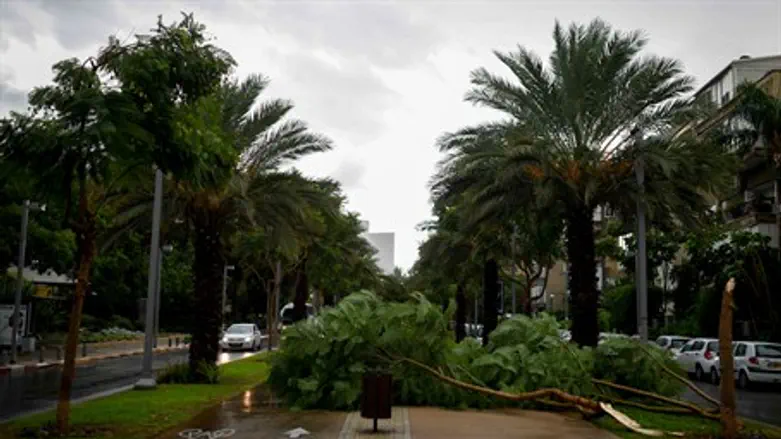
More than 24 hours after the major winter storm that hit Israel Sunday morning, some 40,000 households, mostly in the Sharon region, were still without power – and politicians are hopping mad.
On Monday, the State Control Committee announced that it was opening an investigation into the activities of the Israel Electric Company over the previous 24 hours. The committee, led by MK Karine Elharrar, will meet Tuesday and take testimony from officials from the Agriculture, Interior, Defense, and Infrastructures Ministries.
In what was described as an “Italian strike” - known in the U.S. as a “by the book slowdown” - Israel Electric Corporation workers were accused of dragging their feet on dealing with power emergency calls due to the heavy rains, hail, and high wind that slammed through central Israel Sunday morning. While some progress was made Monday, there were still many tens thousands without power as Monday drew to a close, with hundreds of businesses forced to remain closed for a second day as workers were unable to get into offices, factories, and other facilities.
The Israel Electric Corporation blamed workers for the slowdown. A spokesperson for management said that the IEC “had experienced a large number of calls on power outages, downed power lines, and other phenomenon caused by the heavy rains and strong winds of Sunday morning's storms. However, throughout the day IEC workers stuck to their normal schedule, although they properly should have been on an emergency schedule. The gap between customer needs and available service was the cause of the outages.”
IEC management petitioned the National Labor Court Sunday night, demanding that workers be forced to take on emergency schedules throughout the night until all power was restored. The court complied, but consumers complained Monday that it appeared that not all workers were respecting the decision.
Unions representing workers rejected the IEC's complaints, saying that they had been overworked and overwhelmed, “the result of mismanagement and a lack of resources provided for infrastructure and staff for the past 15 years. It is the state that is responsible for the poor condition of the electricity infrastructure in the country today, with years of zero investment and increasing layoffs. The complaints of management are designed to protect it from the catastrophic results of its policies by blaming workers.”
MK Eitan Cabel (Zionist Union), chairman of the Knesset Economics Committee, said he would demand an investigation into Sunday's events. “We cannot accept a situation where a fight between labor and management will result in the suffering of thousands of families,” he said.